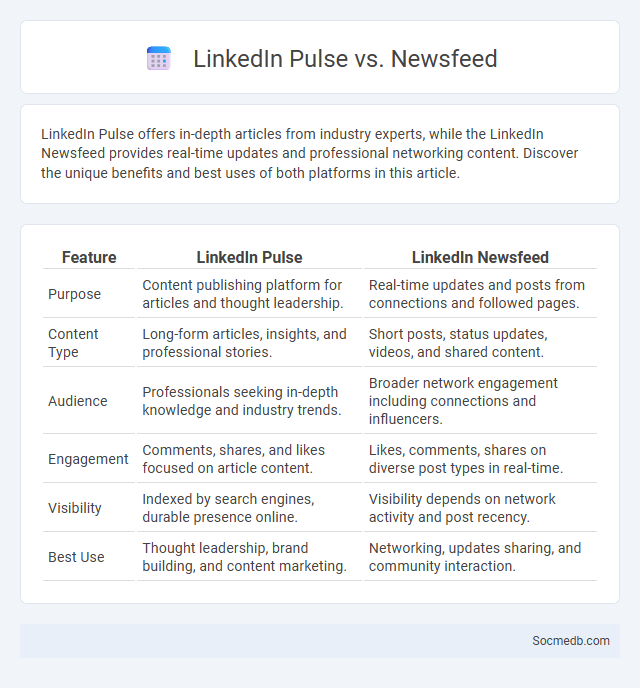
Photo illustration: LinkedIn Pulse vs Newsfeed
LinkedIn Pulse offers in-depth articles from industry experts, while the LinkedIn Newsfeed provides real-time updates and professional networking content. Discover the unique benefits and best uses of both platforms in this article.
Table of Comparison
| Feature | LinkedIn Pulse | LinkedIn Newsfeed |
|---|---|---|
| Purpose | Content publishing platform for articles and thought leadership. | Real-time updates and posts from connections and followed pages. |
| Content Type | Long-form articles, insights, and professional stories. | Short posts, status updates, videos, and shared content. |
| Audience | Professionals seeking in-depth knowledge and industry trends. | Broader network engagement including connections and influencers. |
| Engagement | Comments, shares, and likes focused on article content. | Likes, comments, shares on diverse post types in real-time. |
| Visibility | Indexed by search engines, durable presence online. | Visibility depends on network activity and post recency. |
| Best Use | Thought leadership, brand building, and content marketing. | Networking, updates sharing, and community interaction. |
Overview of LinkedIn Pulse and Newsfeed
LinkedIn Pulse provides a content discovery platform where professionals can share industry insights, thought leadership articles, and news updates tailored to their network. The LinkedIn Newsfeed serves as a personalized stream of posts, company updates, and relevant articles curated by algorithms based on user connections, interests, and interactions. Together, LinkedIn Pulse and Newsfeed enhance professional engagement by delivering real-time, targeted content that supports networking and knowledge sharing.
Key Features of LinkedIn Pulse
LinkedIn Pulse offers a powerful platform for professionals to share industry insights and thought leadership content with a targeted business audience. Its key features include personalized news feeds powered by AI algorithms, integration with your LinkedIn profile to enhance networking opportunities, and the ability to publish long-form articles that establish your expertise. You can leverage LinkedIn Pulse to stay informed on trending topics while building your personal brand in the professional community.
Understanding the LinkedIn Newsfeed
Your LinkedIn Newsfeed curates content based on your connections, interactions, and followed topics to deliver relevant professional updates and insights. It prioritizes posts that generate meaningful engagement, such as comments and shares, tailored to your industry and interests. Understanding this algorithm helps you optimize your content strategy to increase visibility and foster valuable networking opportunities.
Pulse vs Newsfeed: Purpose and Reach
Pulse is designed to deliver real-time, personalized content that keeps You updated on trending topics and breaking news, maximizing immediate engagement. Newsfeed aggregates a broader range of posts from your network, promoting continuous interaction and long-term relationship building within your social circles. Choosing between Pulse and Newsfeed depends on whether Your priority is instant awareness or sustained social connectivity.
Content Creation on Pulse vs Newsfeed
Content creation on Pulse emphasizes long-form, professional articles that showcase your expertise and thought leadership, making your contributions more discoverable among industry peers. In contrast, Newsfeed content prioritizes short, engaging posts, images, or videos that foster quick interactions and real-time conversations with your network. Your strategy should align with Pulse for in-depth insights and Newsfeed for dynamic, immediate engagement.
Engagement Differences: Pulse vs Newsfeed
Pulse offers real-time, dynamic content updates that boost immediate user interaction, while Newsfeed provides a chronological or algorithm-driven stream fostering sustained engagement. Your choice between Pulse and Newsfeed impacts how quickly your audience reacts and the depth of their interaction with posts. Understanding these differences enhances targeted strategies for maximizing social media engagement metrics.
Audience Targeting and Visibility
Effective audience targeting on social media enhances visibility by delivering tailored content to specific demographic groups, increasing engagement rates and conversion potential. Utilizing platform analytics and advanced segmentation tools allows marketers to refine targeting criteria based on user behavior, interests, and location. Optimized visibility results from strategic content placement that aligns with audience preferences and platform algorithms, driving higher organic reach and brand awareness.
SEO and Discoverability on LinkedIn
Maximizing SEO and discoverability on LinkedIn involves optimizing profiles with relevant keywords, engaging in niche-specific content creation, and consistently interacting with targeted professional communities. Utilizing LinkedIn's algorithm by posting regular updates, incorporating hashtags, and encouraging endorsements enhances visibility in search results. Leveraging LinkedIn's native features such as publishing articles and participating in group discussions boosts authority and drives organic traffic to profiles or business pages.
Best Practices for Publishing on Pulse and Newsfeed
To maximize engagement on Pulse and Newsfeed, focus on consistent posting schedules and high-quality visuals that resonate with your target audience. Craft concise, compelling headlines alongside clear calls to action to increase click-through rates and sharing. Analyze performance metrics regularly to refine your content strategy and ensure your posts align with your audience's interests and platform algorithms.
Choosing the Right Platform for Your Content Strategy
Selecting the ideal social media platform depends on the target audience's demographics, content format, and engagement goals. Instagram excels in visual storytelling with images and short videos, while LinkedIn suits professional B2B content and networking. TikTok drives viral reach for short-form videos targeting younger users, whereas Facebook offers broader demographic coverage and diverse content types.
 socmedb.com
socmedb.com